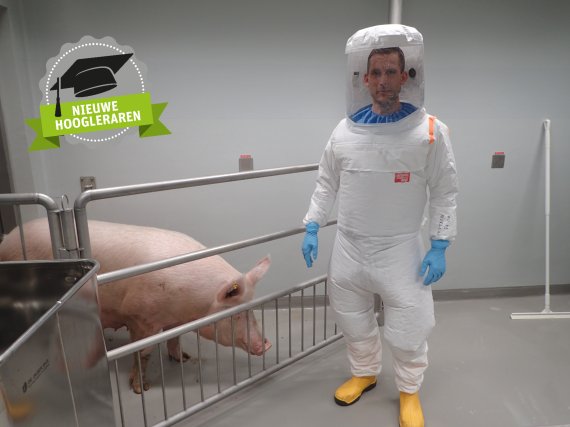© Bioveterinary Research
Arboviruses are pathogens that are transmitted by insects or ticks. Examples include the Zika, Bluetongue and Schmallenberg viruses. In Lelystad, Kortekaas mainly works on the development of vaccines against arboviruses that infect farm animals. For example, he works on vaccines against the Rift Valley fever virus, which has been causing large outbreaks among ruminants and humans in Africa. The virus leads to miscarriages and mortality in animals, and in humans, it leads to influenza-like symptoms, heavy headaches and high fevers. A small percentage of infected humans succumbs to the disease. ‘The mosquitoes that transmit this virus in Africa are also found in Europe’, Kortekaas warns. ‘And the cattle are highly susceptible to the virus.’
Barriers
Various arboviruses can infect the brain of humans and animals and be transmitted from mother to foetus. Both the brain and foetus are protected by barriers, which these viruses are able to penetrate. ‘I want to discover how they do that.’ Together with PhD candidate Judith Oymans, the newly appointed professor will study how different arboviruses are able to reach the brain and foetus. He will carry out this research in the heavily secured facilities of Wageningen Bioveterinary Research in Lelystad. ‘My ultimate goal is to develop better control strategies for humans and animals against arboviruses.’
Schmallenberg
Many new arboviruses have surfaced in the past ten years, Kortekaas says, like the Bluetongue and Schmallenberg viruses in cows, sheep and goats. These are sometimes slumbering viruses that can suddenly cause an epidemic. The professor currently has a cousin of the Schmallenberg in his sights: the Shuni virus, which recently surfaced in Israel.
Triangle
Kortekaas is looking forward to the collaboration on the Wageningen campus. ‘I work in the virus-mosquito-mammal triangle. My chair has been placed with Monique van Oers’ Virology group, in which Gorben Pijlman is also working on arboviruses. Richard Kormelink is also a member of this group; he has vast knowledge of arboviruses in plants. And I will also collaborate with Sander Koenraadt from the Entomology group, where they know all there is to know about mosquitoes. This gathering of expertise makes the collaboration on campus extremely interesting. I expect that the various groups will learn a lot from each other.’ Kortekaas can be found in Wageningen every Monday.

